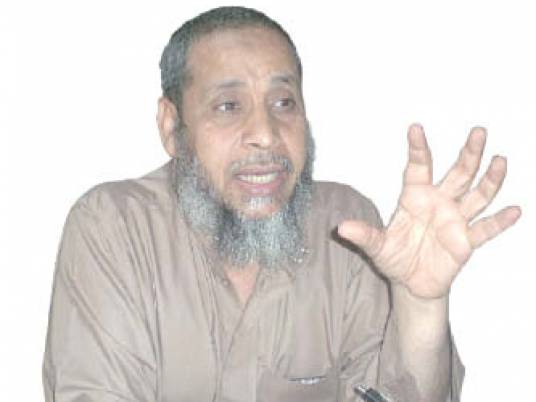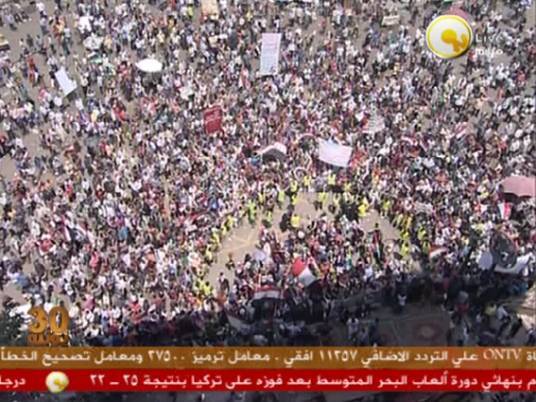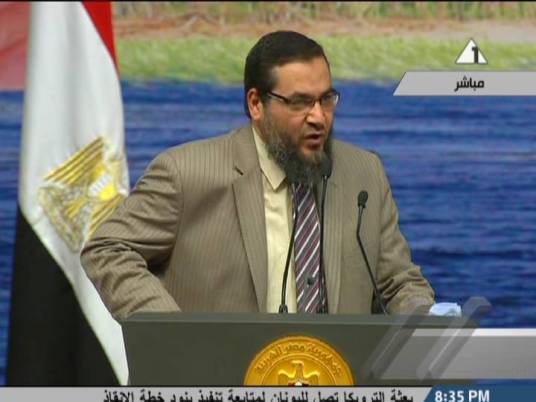
The most noticeable thing about Assiut city’s Abu Bakr al-Sideeq Mosque isn’t the building itself, which stands almost camouflaged among several identically painted apartment blocks, but the signs surrounding it. Along its iron-bar fence and plastered on its walls, printed and handwritten posters advertise the availability of medication, meals and religious lessons — all free and all provided by Jama’a al-Islamiya, the hardline Islamist group that has adopted the mosque as its headquarters.
Across the street hangs a plaza-wide banner of Sheikh Omar Abdel Rahman, the group’s leader — currently imprisoned in the US — and, directly beneath it, a Jama’a-sponsored “meat market” consisting of an empty stall and an abandoned chopping block.
Despite claims of having reformed its violent ways, the group’s politics are still considered problematic by many Egyptians, particularly in the wake of the declared intention to form law-enforcing “popular committees” as a solution to the nation’s increasing security problem. Egypt Independent sat down with Shaaban Ali Ibrahim, president of the group’s public committee, to discuss the issue.
Egypt Independent: How does Jama’a al-Islamiya fit into Assiut society? What role does it play here, and what role should it play on a national level?
Shaaban Ali Ibrahim: Since its inception, the Jama’a has played a crucial role in the public aspects of life in Assiut, and has been active on a social, political and proselytical level. Today, the Construction and Development Party serves as our political arm, but the Jama’a itself has been the main Islamic current in Assiut since 1970.
It has gone through a period of collision with the regime, and consequently, our members were imprisoned for more than 20 years — during which they were subjected to the harshest of conditions and the most brutal of torture methods. But our members are strong, and they emerged from these ordeals as men, more eager than ever to preach and work for the religion of God.
We discovered, upon our release, a changed community, but one we have successfully adapted to. Today, we have resumed our activities in Assiut, and all major cities.
We have our mosques, where we practice the dawah [call] in the name of God, an act we were previously denied. Before the uprising, the regime had prohibited us from proselytizing. We were not allowed to have mosques, and our members were banned from even serving as imams for public prayer services. Now, we are more able to carry out our activities on the ground, in public, to benefit the public.
EI: What sort of activities?
Ibrahim: We distribute bread and butane gas canisters to those who can’t afford them. We hold reduced-price markets, both permanent ones like the meat and produce markets, and also seasonal ones, at the start of the school year — for example, selling textbooks and stationary.
The Jama’a also organizes clothing drives where items are donated, washed and redistributed to the poor, as well as charities to benefit orphans and widows and those living in poverty. We have caravans that offer medical services, specifically for those who live out in rural areas.
We have also been providing security in the form of our popular committees, or at least up until recently, when the media started making a big deal about that.
EI: By popular committees, do you mean a police force?
Ibrahim: Our popular committees have always been about more than what the media is so focused on these days. When we say our popular committees carry out the work of security forces, we use the term “security” in a much broader sense than most people seem to realize.
This has been our belief, and practice, since the revolution: that our popular committees perform all varieties of services that benefit the nation and worshippers, including making them feel secure. We don’t aim to replace the police, we just substitute for them when they choose to withdraw or go on strike or remain unresponsive — and why is this a problem?
Our popular committees also stand in for sanitary workers when they go on strike. Nobody complains about that.
EI: There have been constant tensions, just as there were with the previous regime, between the Islamist parties and the media. What is the root of this problem?
Ibrahim: All media are politicized. This is obvious to anyone with eyes and a working brain.
Look at Upper Egypt, for example, and how it’s presented. Upper Egypt is kept out of the media, just as it is kept out of social and political life. Where is the fair media that identify a problem before it occurs, before lives are lost over it?
EI: Are you upset over a lack of coverage, or over ineffective policy?
Ibrahim: Media is media and it must be changed. Unfortunately, doing so will be difficult, as you are talking about re-educating those who work in media, and reintroducing concepts such as loyalty and patriotism.
These two concepts are sorely lacking. Today, a thug ambushes a civilian car and the media calls him a “patriot.” And if the thug gets killed by the police for what he’s doing, he’s called a martyr.
EI: Maybe he doesn’t need to be killed. Maybe he can just be dealt with in a less extreme manner.
Ibrahim: The police need to be more involved. They have no will, no fangs, and this will not do.
They need to be empowered again. Can you imagine anyone standing up to the police in [former President Hosni] Mubarak’s time the way they do now?
EI: That’s partially how the revolution started. Just earlier, you were complaining about the brutality of the force, which you now sound nostalgic for. Would you condone it if it were carried out on those who, to you, deserve punishment?
Ibrahim: I complained about brutality and ferocity, which, prior to the revolution, we had experienced at the hands of the regime, more so than anyone else. What we are calling for now is a police force that is effective in putting down the threats facing this country.
EI: Are your popular committees heavily armed?
Ibrahim: No. We are not armed, we do not have weapons, and our popular committees do not carry any weapons. This is a statement that has even been made on several occasions by the chief of security in Assiut.
EI: So how do you expect to enforce anything?
Ibrahim: We have a certain influence here. People respect us, they turn to us and they value what we say. This is a bond that has been established through our practices and teachings. Here, our word has weight.
EI: Even in the face of violent crime?
Ibrahim: Yes, for a very important reason: We are respected here. It would be impossible for anyone to attack a member of Jama’a al-Islamiya because we are loved and looked up to. We are also known as members of society. A thug wouldn’t think to attack me because, at the end of the day, I either know him or his family or his friend.
It’s the same with protests. If a protest breaks out here, police will respond violently, whereas we can disperse it simply by talking to people and convincing them to go home. We solve problems the police can’t.
EI: Such as?
Ibrahim: We can address social issues in a way the police cannot, and there’s nothing wrong with that. Just like how the Prophet served as a counsel for his people, we provide the same service.
You might not understand because it’s different in Assiut than it is in Cairo. But say a family has a dispute over inheritance, or a husband and wife are having intimate problems — you can’t take those problems to the police. To the average Assiut mentality, that would be a scandal.
EI: How do your popular committees serve the reformation of the police?
Ibrahim: Societies differ as do their sensibilities. There must be re-education on both sides before you can reconcile the police with the people. It’s a slow process, but otherwise, how will the people learn? We shall teach them. We shall approach them and explain the situation and what needs to be done.
I question whether the police can be re-educated. Whoever chooses to join a force like that, their brain works differently. You can be sure they have the desire to feel superior to the average citizen, to feel more worthy.
We need our police to dignify their position, not use it against others, and this is also something we preach. But as I told you before, we are not attempting to replace anything. Our efforts are limited to advice and preaching. To execute change is the job of the ruler.
EI: What would you say about the ruler’s attempts to change?
Ibrahim: Islam guarantees all rights — even those of animals, not just humans. The term “human rights” is a modern trend, a new phrase for what Islam has been preaching for thousands of years.
Don’t be fooled into thinking there’s anything modern or foreign about this notion of human rights. All rights, even those of other religions, exist in Islam — they are the basis of it.
EI: Speaking of human rights, those medical caravans you mentioned, is female genital mutilation among the services they offer?
Ibrahim: Not yet, no. The caravans are not currently equipped for surgical procedures, but we are continuously updating them, with the help of God. I know what you are getting at, that some people oppose this practice and call it a human rights violation. I would advise them to turn to the fatwas of Sheikh Gad al-Haq on the matter.


